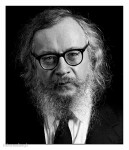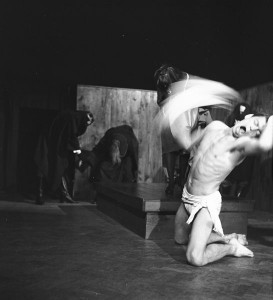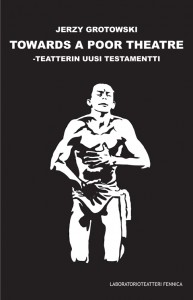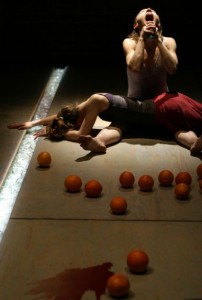Teatr Zar: Grotowski 2.0
In just a few weeks, as many of you followers of The Antigone Project probably know, the cast and team of Antigone is journeying to Poland for a two-week residency at the Grotowski Institute to study with the renowned experimental group Teatr ZAR. This group has inspired the artistic leaders of Cutting Ball for years; Paige Rogers, director of Antigone, has said that “ZAR’s work opened up a whole new world” for her. But what exactly is Teatr ZAR and what do they do?
“Zar” is the name of a type of funeral song performed by the Svaneti tribe, which is native to the highlands of northwestern Georgia, and this moniker beautifully represents the group’s mission: to “demonstrate that theatre does not only relate to thea (Greek for seeing) but it is something that above all should be heard.” To truly understand what being heard means to Teatr ZAR, however, one must return to the earlier work of Jerzy Grotowski.

Grotowski, now considered one of the chief reformers and innovators of 20th century theatre, completed his undergraduate acting training in Krakow, Poland in 1955. Almost immediately after, he headed to Moscow to learn the techniques of the Russian masters, Stanislavsky among them. Upon returning to Poland he mostly worked with the Laboratory Theatre in Opole, pioneering some innovative styles such as “fact-montages” (an early form of documentary theatre), while also cultivating a passion for Eastern and ancient forms of storytelling. These seemingly disparate interests fueled the development of one of his great skills: using extremely avant-garde theatrical forms to tell the most ancient stories.
His developing philosophy on acting focused on removing obstacles and facades rather than accumulating skills, and he called this method via negativa. He said of this negative path, “It is the act of laying oneself bare, of tearing off the mask of daily life, of exteriorizing oneself. Not in order to ‘show oneself off’, for that would be exhibitionism. It is a serious and solemn act of revelation. The actor must be prepared to be absolutely sincere. It is like a step towards the summit of the actor’s organism in which consciousness and instinct are united.”

The Laboratory Theatre moved to Wroclaw in 1965, beginning a period of in-depth research by Grotowski on the relationship between stage and audience. His productions gave the audience new, unexplored roles; it was a collective hero in Sakuntala, and the hero’s confessor in Faust (a role now reminiscent of Shaffer’s Amadeus). In Wroclaw he refined his theory of the “Poor Theatre.” This technique is now irrevocably linked to the name Grotowski, and he published a book on the subject in 1968.
 “Poor Theatre” takes the via negativa as far as possible, stripping away traditional theatrical devices until the body of the actor is the only instrument of storytelling. (For a video of physical training in the Grotowski method, click here).
“Poor Theatre” takes the via negativa as far as possible, stripping away traditional theatrical devices until the body of the actor is the only instrument of storytelling. (For a video of physical training in the Grotowski method, click here).
In the 1970s, Grotowski retreated from creating theatrical productions to focus on his study of central-Asian spirituality and culture, and on his teaching of his methods to the next generation of theatre-makers from around the world. He created the Grotowski Institute in Wroclaw, Poland, later acquiring and refurbishing an old barn in the forests of Brzezinka as a place to workshop his pieces intensively and without urban interruptions. Later, he left Poland for Pontedera, Italy where he founded the Workcenter of Jerzy Grotowski and Thomas Richards. In 1999 Grotowski died, the same year a group of apprentices at the Grotowski Institute began taking annual research trips to The Republic of Georgia. Jaroslaw Fret was of these apprentices, and with several in the research group, he founded Teatr ZAR. Today Fret is the director of the Grotowski Institute in Wroclaw and Brzezinka, Poland. He will be observing some of Cutting Ball’s work in Brzezinka as they pariticpate in a workshop with four founding members of Teatr ZAR.
Teatr ZAR carries on Grotowski’s work by cultivating a passion for ancient culture and storytelling, especially through song. They also continue his exploration of spirituality, by perpetuating the idea that “art is not only complementary to religion but can fill the dynamic chasm between the everyday and transcendent life.” Teatr ZAR has been developing its three-part opus, Gospels of Childhood: The Triptych, for over a decade.

Ancient songs and human bodies are the inspiration and the driving force behind this piece, and all three parts have been performed around the world. (For a video of Teatr ZAR from the Museum of Contemporary Art in Chicago, click here). Up next for Teatr ZAR is Armine, Sister a piece inspired by ancient Armenian culture as well as the genocide of the 20th century. Cutting Ball is ecstatic to join Teatr ZAR in advancing Grotowski’s research at his Institute in Brzezinka.
By Linnea Hodge, July 28 2014
More Info:
For more on Grotowski, an in-depth interview with the man himself can be found here.
For more on Teatr Zar, Jim O’Quinn (Editor-in-Chief at the American Theatre Magazine) has written an excellent article that can be found here. We are excited to say he’ll also be accompanying the Antigone cast on the trip to Brzezinka!